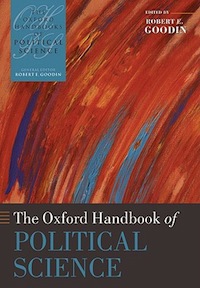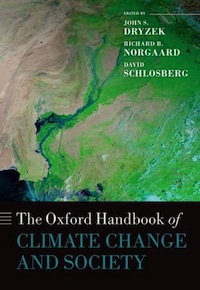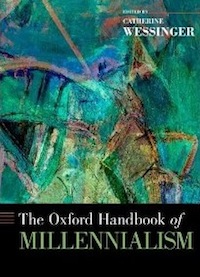Having taken a look at OUP’s Handbook of International Relations last Autumn, our first student book feature of 2012 is going to weigh in on three of its sister volumes: The Handbook of Political Science, The Handbook of Climate Change and Society, and the Handbook of Millennialism.
As you would expect, each of the three volumes selected in this feature is carefully compiled, well structured, and delivers on its remit of introducing a substantial collection of student-focused scholarly work in their respective fields. While the books might not immediately appeal in a dedicated sense to students of international politics as the IR handbook does, they provide good reference tools and significant resources to students specialising or studying for modules in more distinct areas.
While the handbooks on Climate Change and Millennialism are currently only available in hardback and are prohibitively expensive as a result, they will be worth consulting should your studies cross over with their subject areas. They may also be available to you via Oxford Scholarship Online which is a subscription service offered to academic institutions – much like an electronic journal subscription package, and you might want to check with your librarian if your department has access.
 The first book in this feature will have the broadest appeal of the three – though it is entering into a crowded market. The Oxford Handbook of Political Science takes elements of each of the ten volume OUP Political Science Handbook series, and merges them into one master volume. While it is inevitably less complete than the other texts, it does represent a more accessible (and affordable) offering than a straight-forward multi-volume series. As a result, this book will find its way onto many desks and become dog eared and worn in very quickly. Nonetheless, putting the whole field of political science into one accessible volume is a tall order – and at over 1200 pages this book is nearly three times the length of a standard textbook!
The first book in this feature will have the broadest appeal of the three – though it is entering into a crowded market. The Oxford Handbook of Political Science takes elements of each of the ten volume OUP Political Science Handbook series, and merges them into one master volume. While it is inevitably less complete than the other texts, it does represent a more accessible (and affordable) offering than a straight-forward multi-volume series. As a result, this book will find its way onto many desks and become dog eared and worn in very quickly. Nonetheless, putting the whole field of political science into one accessible volume is a tall order – and at over 1200 pages this book is nearly three times the length of a standard textbook!
In conjunction with more detailed volumes, the Handbook of Political Science has the potential to be a useful resource. A student of international relations, for example, might primarily utilise the Handbook of International Relations – or one of the many other IR textbooks on the market – as their go-to reference, whilst also consulting this broader overview into and around the discipline when first approaching issues that lie outside of mainstream IR.
The Handbook has individual multi-chapter sections on all the areas you would expect from a text in this field, such as methodology, public policy, political analysis, comparative politics, behaviour, and institutions, law, and political economy. No textbook will offer a one-stop shop for your studies – they simply do not have the space to address key ideas and issues in sufficiently rigorous detail. Rather they aim to provide critical information and context in order to set readers on a productive track at the beginning of their research. As a result of its broad scope (a strength), The Handbook of Political Science is necessarily less comprehensive, and will be consulted as a complimentary textbook rather than a primary one.
 The second handbook in this feature is the smallest, weighing in at only (!) 727 pages. The Oxford Handbook of Climate Change and Society is an excellent collection which aims at a broad multidisciplinary readership. As the editors note regarding the subject at hand – in a style that merits direct quotation:
The second handbook in this feature is the smallest, weighing in at only (!) 727 pages. The Oxford Handbook of Climate Change and Society is an excellent collection which aims at a broad multidisciplinary readership. As the editors note regarding the subject at hand – in a style that merits direct quotation:
The stakes are massive, the risks and uncertainties severe, the economics controversial, the science besieged, the politics bitter and complicated, the psychology puzzling, the impacts devastating… so human systems will have to learn how better to respond.
With such a set of concerns in mind the book takes the reader on a journey through science and society, economics, public policy, ideas of justice – and most importantly for readers of e-IR – deals with global action (and inaction) on climate change issues. You will step away from this volume having accessed philosophical, political, legal, geographical, historical and scientific perspectives on climate change. Most of these issues are delivered well for non-specialist audience and will suit those who might not appreciate a more jargon heavy text.
The layout is kind to the reader, with a significant 100 page opening section detailing the challenge of climate change in a historical context. This lays an excellent foundation for the subsequent text and is a must read for anyone using this book. The following sections are designed in such a way as they can be isolated and read alone, with each comprising of various sub-chapters. For example, the Global Governance section presents 4 strong chapters, incorporating regime analysis and international law, which will serve any student in that sub-field well as a solid reference point. A similar pattern is observed in the Security section, which in 3 chapters delivers strong analysis on the effects of climate change on human security, and on the refugee issue.
It is possible to read sub-chapters independently as the need and/or interest arises. In that sense, the chapter on China by Miranda A. Schreurs proves to be one of the most interesting in the volume. Also worthy of mention is a chapter on the role of religions in climate activism by Laurel Kearns, and a chapter on indigenous peoples and cultural losses by Robert Melchior Figueroa: Each proving a fulfilling stand alone read. This book might well prove to be a gift that keeps on giving throughout your studies due to the impressive range, often unique, and highly topical nature of the 45 sub-chapters.
 While the Climate Change Handbook is a clear example of a multidisciplinary volume with a wide reach, the Oxford Handbook of Millennialism is a comparatively narrow affair. Millennialism – which the book describes as the belief in the end of the world and the collective salvation of mankind by a divine or superhuman plan – may seem an odd choice for a student facing academic handbook. It’s reach has amplified in the age of the internet, 2012 / end of the world prophecies, and draws its scope as wide as alien conspiracies, prophetic personalities, fundamentalist religions, and the new age movement.
While the Climate Change Handbook is a clear example of a multidisciplinary volume with a wide reach, the Oxford Handbook of Millennialism is a comparatively narrow affair. Millennialism – which the book describes as the belief in the end of the world and the collective salvation of mankind by a divine or superhuman plan – may seem an odd choice for a student facing academic handbook. It’s reach has amplified in the age of the internet, 2012 / end of the world prophecies, and draws its scope as wide as alien conspiracies, prophetic personalities, fundamentalist religions, and the new age movement.
The logic in creating a volume from these seemingly disparate areas of study is that clear patterns emerge from cross cultural and comparative studies of millennial groups – a theme that links the 35 chapters. The volume reaches widely not just in its coverage of numerous millennial groups, but in the sense of being truly global in scope by considering millennialism in Africa, Asia, the Caribbean and the Pacific. It also places millennialism in context reaching back to the nineteenth century. This was a particularly refreshing aspect of the volume which provides a solid entry point for a non specialist reader.
Why include this volume in our feature on student books? Much that is discussed in the various chapters is relevant to the study of politics. While the theme, and methodology is based on religious studies and written largely by religion scholars (with a light scattering of history and philosophy-leaning contributors), there is a great deal of interest here for students of international relations. This is particularly so for those interested in theoretical approaches which include social issues such as Social Constructivism, or those studying the influence of religion on politics. The book is largely accessible to non-specialists, and several of its chapters are fascinating stand alone reads – one notable example being the chapter: ‘Millennium, Apocalypse, and American Popular Culture’ by Douglas E. Cowan. This may not be a recommended purchase, but if your library has a copy or an online subscription, it is certainly worth looking through.
Further Reading on E-International Relations
- New Book – Global Politics in a Post-Truth Age
- Open Access Book – Sounds of War: Aesthetics, Emotions and Chechnya
- New Book – Global Climate Justice: Theory and Practice
- Open Access Book – Realism in Practice: An Appraisal
- Student Essay Award – Win Free Books and Get Published
- Student Essay Award – Win Free Books and Get Published